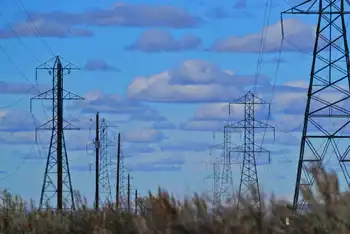Electricity bills head downward
CALGARY - - Albertans will be paying less for electricity in the wholesale market by 2005 than they would have under the old regulated rate system, a new study suggests.
Electricity prices are nearing the rates that would have resulted under regulation, according to the review of Alberta's two-year old electricity market by the Massachusetts-based firm of Tabors Caramanis & Associates for the Independent Power Producers Society of Alberta.
And in some cases, prices are expected to drop below rates Albertans would have faced had the province retained a regulated model, the study found.
"Market prices are converging with where prices would have been had the province continued under a regulated regime," said Seabron Adamson, one of the authors of the report.
"Alberta has achieved a great deal in a relatively short period of time."
Under one scenario, wholesale electricity prices are forecast to fall to $44.20 per megawatt hour in 2005 under deregulation, compared to $53.33 per megawatt hour under the regulated rate structure.
That compares to $64.48 per megawatt hour forecast for 2003.
Jim Wachowich, head of the Consumers' Association of Alberta, said the study's comparison is irrelevant since a regulated market is no longer an option.
"The wholesale market is functioning. The question is whether it's functional," he said.
"The volatility -- the spikes and troughs -- shouldn't be there in a wholesale market that is functional."
According to the study, added competition has also helped push down electricity prices.
Compared to power pool prices in 1999, demand for electricity rose more than 16 per cent in 2002. Natural gas prices, a key component of electricity prices, rose 40 per cent.
However, in 2002 power pool prices were only three per cent higher than in 1999.
The study also found the effects of competition and new generation technology have improved overall efficiency, and as a result power prices are not rising as steeply as natural gas prices.
"We recognize that Albertans have had real concern with the market's evolution at the residential level," said Rick Kline, IPPSA chairman, in a release.
"This study helps us understand that the fundamentals of the generation and wholesale market are working."
IPPSA, an advocate for competition in the province's electricity industry, represents about 150 power producers, wholesalers and supporting industries across the province.
A council studying a variety of problems arising from deregulation is expected to report to Energy Minister Murray Smith next month.
Related News

Why subsidies for electric cars are a bad idea for Canada
TORONTO - Bad ideas sometimes look better, and sell better, than good ones. Not always, or else Canada wouldn’t be the mostly well-run place that it is. But sometimes politicians embrace a less-than-best policy – because its attractive appearance may make it more likely to win the popularity contest, right now, even though it will fail in the long run.
The most seasoned political advisers know it. Pollsters too. Voters, in contrast, don’t know what they don’t know, which is why bad policy often triumphs. At first glance, the wrong sometimes looks like it must be right, while better and…




